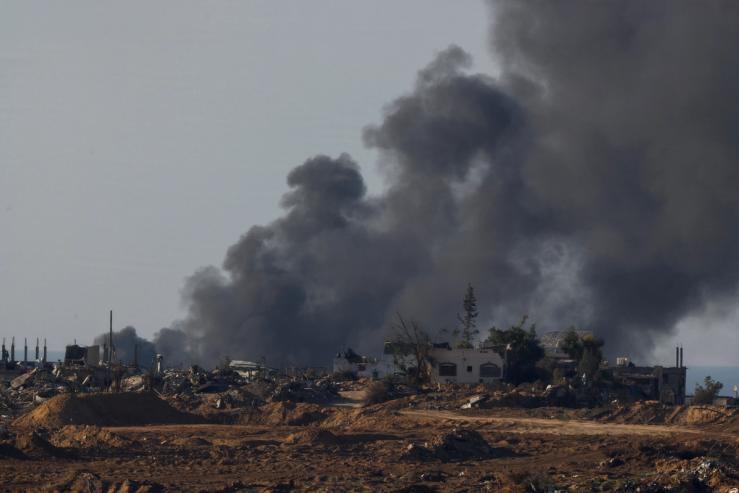The News
Israel has shifted to a less intense phase of its military offensive in Gaza, its chief military spokesman said Monday, after weeks of efforts by the U.S. to convince the country to scale back its campaign.
The same day, protesters calling for a ceasefire interrupted a speech by U.S. President Joe Biden – who responded by saying he had been “quietly working with the Israeli government to get them to reduce and significantly get out of Gaza.”
The Israeli military confirmed last week it is pulling thousands of troops from the enclave, following weeks of pressure from the U.S. and other nations that have raised alarm about the widespread devastation. More than 22,000 Gazans have been killed, according to the Hamas-run health ministry.
SIGNALS
Israel has made progress, but Hamas probably has a “deep bench”
Most of Hamas’s command structure is “gone,” an unnamed intelligence officer told The Economist in December, while The Institute for the Study of War found that 11 out of the group’s 30 battalions have been degraded to the point it would be difficult to perform their missions – but said Hamas likely maintains a “deep bench of experienced military commanders.”
Those losses have made it possible for Israel to scale back its invasion, Seth Frantzman, a fellow at a think tank in Israel, told The Hill. If Israel’s claims of having defeated almost all Hamas battalions in the northern Gaza Strip and most in the central Gaza Strip is accurate, there shouldn’t be much more to defeat beyond “remnants of Hamas in the south,” he said.
Israel’s lack of restraint has made the U.S. look weak, some watchers say
“The United States is losing respect, it’s losing credibility as a powerful nation – it’s looking weak,” former Irish President Mary Robinson, speaking on behalf of a group of global leaders, said in an interview on RTÉ News in December. She pointed to Israel ignoring U.S. calls for restraint, which began around the time the war did, as proof.
Israel’s military strategy in Gaza is now inextricably linked with the world’s perception of U.S.strength, analysts say. “The Biden team’s record of holding Israel to account on anything to do with this crisis is extremely weak,” columnist Howard W. French wrote for Foreign Policy on Monday, “and its willingness to stand up to Israel by denying it military or political support still seems close to nil.”
Intensifying fighting on Lebanon’s border worries U.S.
Fighting across the Israel-Lebanon border intensified this weekend as the Lebanese militant group Hezbollah struck an air traffic control base in northern Israel, the Israeli military said, and Israel killed one of Hezbollah’s commanders in a counterstrike. This is not the first time the war has stretched into Lebanon – more than 130 Hezbollah fighters have been killed since Hamas’ Oct. 7 attack on Israel.
The weekend escalation has complicated U.S. efforts to prevent a broader conflict, PBS reported, with Secretary of State Antony Blinken saying “This is a conflict that could easily metastasize, causing even more insecurity and even more suffering.”



